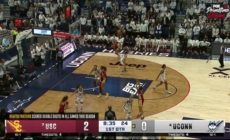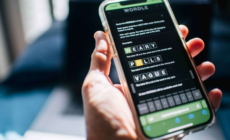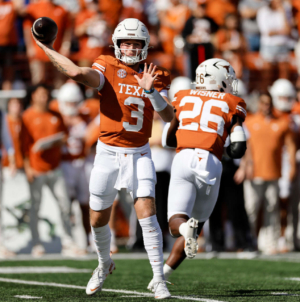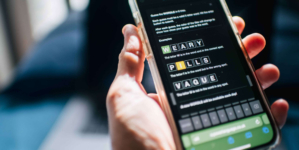-
The Circle of Light Closes and Illuminates the World - 8 mins ago
-
Texas, fueled by adversity and last year’s CFP loss, tops Clemson in playoff opener - 11 mins ago
-
College Football Playoff: Texas Eliminates Clemson, Will Play Arizona State in Peach Bowl - 31 mins ago
-
Juju Watkins drills a 3-pointer over Paige Bueckers, extending USC’s lead over UConn - 55 mins ago
-
How To Get Your Steps in Over the Holidays, According to Personal Trainers - about 1 hour ago
-
Tom Brady's LFG Player of the Game: Ravens' Lamar Jackson | Week 16 DIGITAL EXCLUSIVE - 2 hours ago
-
Alpha Prime Racing Confirms Huge Crew Chief Signing For NASCAR Xfinity Series - 2 hours ago
-
2 U.S. Navy pilots eject to safety after friendly fire downs their fighter jet - 2 hours ago
-
JuJu Watkins and No. 7 USC hold off Paige Bueckers and fourth-ranked UConn 72-70 - 2 hours ago
-
Today’s ‘Wordle’ #1,282 Answers, Hints and Clues for Sunday, December 22 - 2 hours ago
Legal Analysts React to DOJ’s Election Warning to Elon Musk
Legal analysts are weighing in on the Department of Justice (DOJ) reportedly warning billionaire Elon Musk that his $1 million rewards to people who sign a petition amid this year’s presidential election may be illegal.
Musk, who has endorsed former President Donald Trump, has been randomly awarding a $1 million prize to one registered voter per day for signing a petition pledging their “support for the First and Second Amendments.”
The lottery-style giveaway is offered by Musk’s “America” super PAC and is only open to voters in the potentially crucial battleground states of Pennsylvania, Michigan, Wisconsin, North Carolina, Arizona, Georgia and Nevada.
On Wednesday, CNN reported that Musk’s super PAC had been sent a letter from the DOJ’s public integrity section over the prize program potentially violating federal election law, which prohibits payments for voting and registering to vote.
Musk defended the giveaway, saying it does not require entries to be from voters of any particular political party and that “you don’t even have to vote,” although only registered swing state voters are eligible.
JIM WATSON/AFP
Dave Aronberg, state attorney for Palm Beach County, Florida, told Newsweek that Musk was operating in “a gray area of the law” via direct message on the billionaire’s social media platform X, formerly Twitter.
“It’s complicated,” Aronberg said. “Under federal law, you can’t pay someone to register to vote or to vote. But that’s not what he’s doing here. It seems like Musk is operating in a gray area. He’s not directly paying them to vote or to register to vote, but rewarding people at random who do.”
“I don’t think the DOJ warning will stop the richest person in the world from doing this and everything else he’s been doing to try to elect Trump,” he added. “Prosecutors don’t like gray areas, so I would be surprised if criminal charges followed.”
Former federal prosecutor Neama Rahmani, president of West Coast Trial Lawyers, agreed that Musk was “walking a very fine line” but would likely not be prosecuted, in comments emailed to Newsweek.
“Musk is walking a very fine line,” Rahmani said. “Federal law is clear. He can’t pay someone to vote or to register to vote … Paying someone to sign a petition isn’t necessarily illegal, unless the petition is just a pretext for bribing participants to vote or register to vote.”
“I don’t think there is enough for a criminal prosecution,” he added. “Musk has probably done enough to frame this as a payment or lottery for signing a petition. The fact that the signers have to also be registered to vote to qualify is dubious, but not enough to be a clear violation under our existing laws.”
Syracuse University law professor David Driesen suggested the Musk and Trump were “trying to tilt the electoral playing field,” while arguing that the DOJ had been “mealy mouthed” in reportedly merely warning Musk that his actions “may” be illegal.
“Allies to autocrats try to help them tilt the electoral playing field,” Driesen said in emailed remarks. “That’s how they destroy democracies. And that is what Musk is doing. It’s good the Justice Department is reacting to this, but it’s not enough. To just say it may be illegal is mealy mouthed when you’re dealing with someone who has a lot of resources.”
“The agency should say that if Musk does not stop this, they will launch a criminal investigation,” he continued. “Criminal charges in this case might be hard, because it’s got this disguise of legitimacy … It’s more likely to be a civil enforcement matter. The DOJ should keep its charging decisions until late in the process.”
Newsweek reached out for comment to the DOJ via online press contact form on Wednesday night.
Musk’s super PAC is also offering swing state petition signers who recruit others payments of $47 per registered voter referred, with the prize increasing to $100 in Pennsylvania, where polls show Trump and Vice President Kamala Harris neck-and-neck with less than two weeks before Election Day.
A poll released by YouGov this week found that a 62 percent majority of Americans believe that it should be “illegal to pay people to sign a political petition,” with only 17 percent endorsing the legality of payments for signing political petitions.
Source link






























